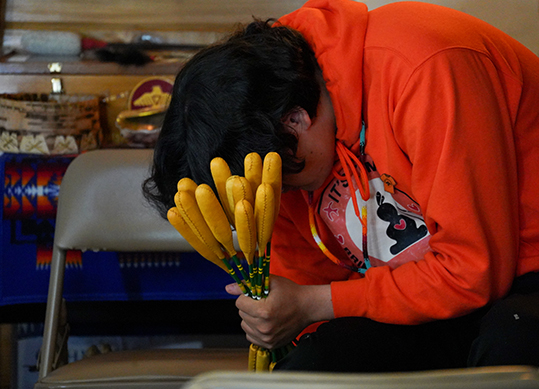
Health Resources
The information in this section will provide information on the impacts of the Indian Residential School system
to the survivors, their families and First Nation communities. It is adapted from the booklet “The Soul Wounds of the Anishinabek People: The Psychological and Intergenerational Impacts of the Indian Residential School System” by
Dr.Brenda Restoule. C. Psych.
The legacy of the Indian Residential School System continues to be affecting the survivors, their children,
grandchildren and communities they live in. These experiences can be found for individuals, families and communities in the mental, emotional, physical, social, economical and spiritual parts of their lives. Understanding the soul wounds or impacts this has had across the generations can assist in creating healing and wellness for Anishinabek people.
The psychological and inter-generational impacts of the residential school system
Through the Indian residential school system, many First Nation children suffered neglect and physical,sexual and psychological abuse while enduring harsh living conditions under the pretense of gaining an education. As a result many children experienced personal and cultural degradation that lasted a lifetime for many of them.
The survivors often believed these experiences to be traumatic and resulted in long-term negative impacts across many areas of their lives such as relationships, parenting, health, mental health, beliefs and coping. Many of the survivors were left without any supports or help to heal from the traumas they experienced in the Indian Residential School (IRS) system. In some cases, the survivors didn’t recognize some of their problems as being connected to the Indian Residential School experience. As the survivors had families of their own they unintentionally placed their children at
risk of being exposed to these same long-term negative impacts. In doing so, they transmitted their trauma and its effects to their children who were often unaware of their parents’ experiences in the Indian Residential School system.This transmission of trauma is known as inter-generational trauma transmission and it has negative long-term impacts across the generations.
Today there is more awareness of the serious negative experiences that the survivors of the Indian
Residential Schools were exposed to, trauma and its impacts, and the ability to transmit trauma across generations. As survivors and their families speak out about the trauma there are opportunities available using cultural and counselling supports to healfrom their soul wounds.
What happened to the children while at the school?
- Forcible removal of their cultural identity such as cutting of hair, stripped of traditional clothing and possessions
- Renamed with ‘Christian’ names or known only by a number
- Unsanitary and overcrowded conditions
- Exposure to illnesses such as tuberculosis with lack of effective and immediate health care
- Inadequate food and clothing
- Physical, sexual, psychological, emotional and spiritual abuse
- Forced replacement of spiritual beliefs by religious teaching
- Physical and emotional separation from parents, grandparents, extended family, siblings and the opposite sex
- Death due to violence, suicide, malnourishment, disease, exposure to extreme weather conditions
- Loss of language
- Loss of cultural practices and customs
What are the long-term impacts to survivors of the Indian Residential School system?
- Inability to express feelings about the abuse they suffered in the schools
- Internalized feelings of anger, fear, grief, shame and guilt
- Substance abuse, addictions
- Self-sabotaging behaviours
- Violence directed toward others or self (i.e., suicide, self-harm)
- Risk taking behaviours
- Avoidance
- Mental health problems such as anxiety, depression and Post-Traumatic Stress Disorder (PTSD)
- Cultural alienation
- Poor or no interpersonal and relationship skills
- Lack of trust or belief in others or of a safe and predictable world
- Lack of loving and effective parenting skills
- Inability to effectively handle conflict in healthy ways

Trauma
There are different types of trauma. Physical trauma is the result of a physical wound or injury. Psychological trauma is the result of extraordinarily stressful events that break a person’s sense of security and predictability,leaving one feeling helpless and vulnerable.
It does not require a physical injury to be considered traumatic. Survivors of the Indian Residential School system often experienced psychological trauma as many report feeling alone, frightened and overwhelmed.




